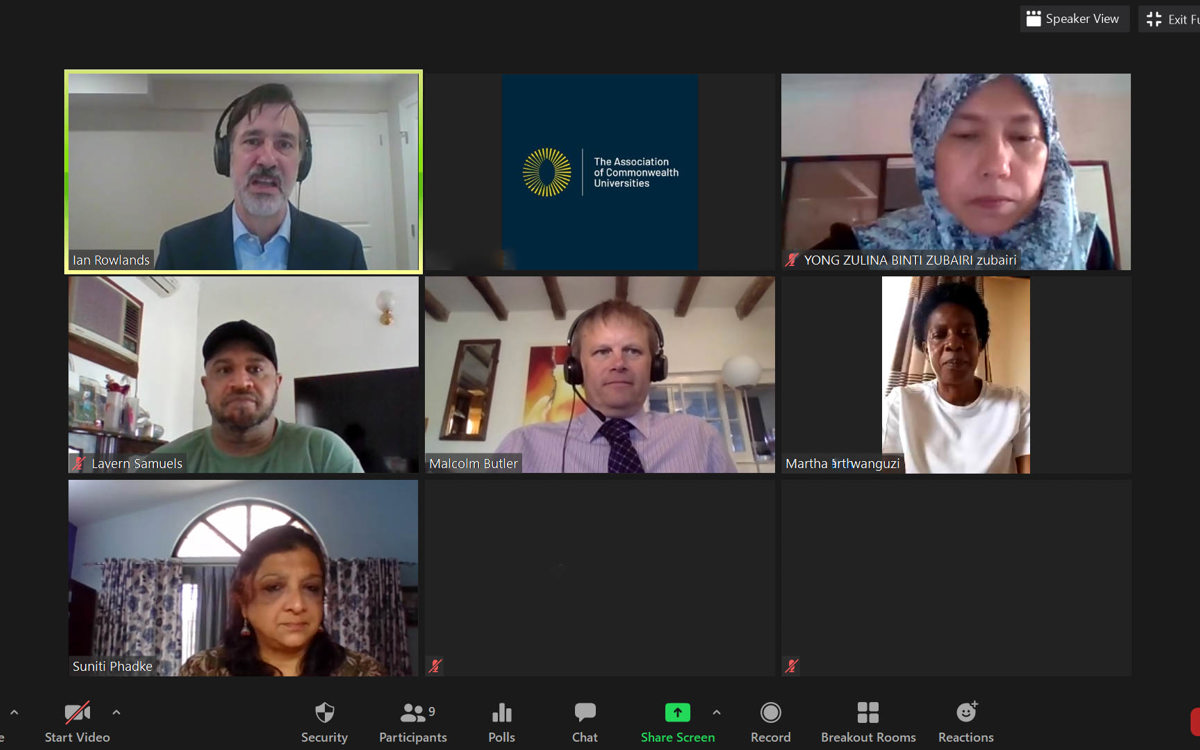
During the past decade, most universities have become more internationalised. Looking across borders for a variety of reasons – international student recruitment, outbound student experience, research collaborations, alumni engagement, etc. – many have created a university-level international office to lead their broad range of international activities. Like others, these same international offices have been reacting, and are continuing to react, to multiple challenges in wake of the global pandemic. And, again like so many others, they are also needing to think about the longer-term – about what their ‘new normal’ may look like going forward.
To share experiences and perspectives, the Association of Commonwealth Universities (ACU) convened Pro-Vice Chancellors, International and Heads of International Offices (or the equivalent) from six universities to discuss the future of universities’ international offices. (See list of participants below.) We identified the area of interest, seeded some potential themes to elaborate, but also presented a ‘blank field’ upon which participants could plant their own ideas. Through an iterative and collaborative process, each participant gave their answers to eight questions (including an open-ended one), reacted (in an online discussion) to the aggregated responses, and then reviewed the final draft of this article.
The result was an informed, wide-ranging, and frank exchange of experiences, perspectives, information, and ideas. The paragraphs that follow do not present an exhaustive report upon all issues raised during the multi-stage process (3,000 words of shared text and 90 minutes of real-time conversation). Instead, they highlight a limited number of themes that were prioritised by at least a couple of participants. And all contributions were in reaction to the following overarching question: How might university international offices’ activities change going forward, post-pandemic (as compared to how they were functioning before the pandemic)?
The future for internationalisation
Budget challenges and travel restrictions will continue to impact universities’ international offices. The former is encouraging all to reflect upon – and to articulate clearly – their unique contributions to the institution’s mission. And the latter is sidelining, at least temporarily, a key traditional means of facilitating internationalisation.
Notwithstanding the challenges and opportunities these raise (more about those below), the value of internationalisation has been highlighted more than ever. The pandemic is illuminating the importance of engaging with contributions from multiple jurisdictions in order to advance learning, in order to catalyse discovery, in order to develop citizenry, and in order to solve the world’s problems.
International offices should thus feel confident that they have a robust reply to the ‘why’ question – that is, ‘Why should internationalization be a critical part of the university’s plans going forward?’ Where they will, however, have to recraft their answer is in response to the ‘how’ question – that is, ‘How will internationalisation be operationalized going forward?’
International learning
The safety and well-being of students far from home – outbound exchange and other students, and on-campus international students – was an early pandemic-time priority for international offices. As the global health crisis continued to unfold, it became clear that non-travel internationalisation activities – already part of many universities’ agendas – would be given even greater priority and visibility in the near-future.
Collaborative online international learning (COIL) – that is, virtually connecting learning environments across borders – presents an opportunity to enrich even more students’ experiences. Traditional (physical) mobility (e.g., study abroad programmes) has sometimes been criticized for its elitist nature (given that it often has significant financial barriers to entry). By contrast, virtual international activities can not only be made accessible to more students, but they can also be combined in creative and impactful ways.
But COIL and associated ‘internationalisation at home’ experiences come with their own set of challenges. Appropriate digital access is by no means guaranteed – not for students from lower-income households, nor for instructors from lower-technology backgrounds. And not all of the positive learnings from cross-cultural experiences can necessarily be generated by shorter, screen-based interactions – this applies not only to insights from curricula elements, but also to the impacts of co-curricular experiences (for instance, food, arts, and sport).
But such challenges can be met. And international offices can lead by harnessing the learnings from the recent digital ‘on-campus’ revolution and by applying them across borders; international offices can facilitate co-creation of multi-university learning modules, and they can support cross-cultural education amongst instructors and professional services staff. Students themselves – many of whom are not only well-versed in the technologies, but whom also have a global outlook at their core – can be key allies in moving this forward.
International partnerships
Universities’ international partnerships are resilient. In particular, those based upon more formal institutional connections and those based upon deep personal links will most likely weather the impacts of the pandemic in the short-term.
International offices have formed partnerships with other universities from around the world, and they are increasing their use of many of these connections. Tried and trusted collaborations – including those made effective by agreements and administrative support – will continue to offer additional means of delivering value to students. Sharing curricula, pooling resources, and split-site graduate degrees are just three examples of how peers will come to value the foundations they have built together in more formal partnerships.
Similarly, grass-roots internationalisation initiatives – the kinds that are often focused upon a specific educational initiative, whether a specialised teaching or research area – will continue to flourish, as long-lasting personal connections can be readily sustained by virtual means.
But the ‘bit in the middle’ is especially challenged by the pandemic’s impacts. How might collaborative areas that are not yet institutionally-supported nor champion-led still be nurtured to see if they ‘have legs’? Traditionally, in international education, it has been the large international conferences where many of the collisions to advance such initiatives have taken place.
Virtually every international office leader can point to an international collaboration that has been moved forward by a ‘chance meeting’ at an international conference. Two such examples of many include: the chat at the end of a session with the person beside you as you both reflect upon Speaker Two’s provocative remarks; and the group dinner where conversations about one’s children create a safe space for ‘crazy ideas’ to be aired. In the near-term absence of such gatherings, international offices must lead to ensure that enabling conditions for creativity in international education still exist.
Opportunities going forward
Yes, the pandemic presents challenges for all of us – universities’ international offices included. But it also presents opportunities -- opportunities to reflect upon priorities, to challenge inertia, and to reimagine activities. As noted above, internationalisation is more important now than ever. And the international office is a critical partner in on-campus discussions as individual universities plan for the future.
Moreover, collectively, universities’ international offices have important roles to play – sharing experiences, assembling best practices, co-creating new initiatives, etc. Indeed, this very exercise did – in its own small way – just that. Over the course of a month, all participants connected, learned, and took actionable items away from the conversation.
Thus, by virtue of initiating this activity, the Association of Commonwealth Universities (ACU) contributed to the work of the sector – bringing together leaders who might otherwise not meet, facilitating their interaction, and advancing their ideas. Indeed, by doing so, the ACU builds upon its tradition of ‘convening the sector’ and demonstrates how it continues to be committed to this service, augmenting its traditional means of doing so (newsletters and in-person meetings) with innovative mechanisms that help to build a better world through higher education. Building on the success of this forum, moreover, the ACU has planned a series of virtual summits for the coming year to explore the changing shape of internationalisation.
Quotes from participants
As we recover from the pandemic, university leaders have to rise to the challenge; and as we lead the change, be mindful to be flexible, creative, and embrace diversity. International collaborations are ever more relevant as we reach out to partners for social cohesion, solidarity and work on meaningful activities.

Adopting modern technologies such as collaborative online international learning (COIL), virtual meetings, conferences and supervision will drive internationalisation forward for universities.

While there will always be areas of greater priority and alignment, I believe that a true long-term partnership is one in which there are many facets of engagement and collaboration that are of mutual benefit to the parties involved. In an uncertain, and yet to be defined future world, there is much to be gained from the potential that can be achieved more easily from deepening and strengthening current collaborative relationships. With likely future constraints on global mobility, the use of international alumni, who hold and epitomise the culture and values of our universities, could prove to be invaluable in establishing and strengthening overseas connections.

International collaborations flourish in the environment of trust. Trust is critical in building and maintaining relationships. During a crisis, such as COVID-19, where normal activities may have slowed down, it's time to think and assess which international partners are most successful and deepen/enhance those partnerships. Across the globe, universities have fostered online international activities, we have to ensure that we find ways to make them not only transactional, but also experiential.

The growing complexity of the global challenges that we are facing asks for all of the society and its institutes, including government and education bodies, private businesses, social enterprises and communities to unite and support each other to overcome the adversity. Universities can and should be active agents in this process. The unpredictability of the future due to the looming environmental crisis highlights the need for the universities’ internationalisation strategies and operations to be extremely flexible and adaptable to whatever conditions we may be facing. Yet it is more paramount than ever to support and strengthen the intellectual and cultural understanding across countries and nations that may help to fight with the crisis itself.

Research topics will more likely reflect the link between the local and the global and the global on the local. Internationalization will increasingly be seen through the lens of graduate attributes rather than an elite, elusive and exclusive activity.


Malcom Butler

Julia Innocente-Jones

Martha Muwanguzi

Suniti Phadke

Lavern Samuels

